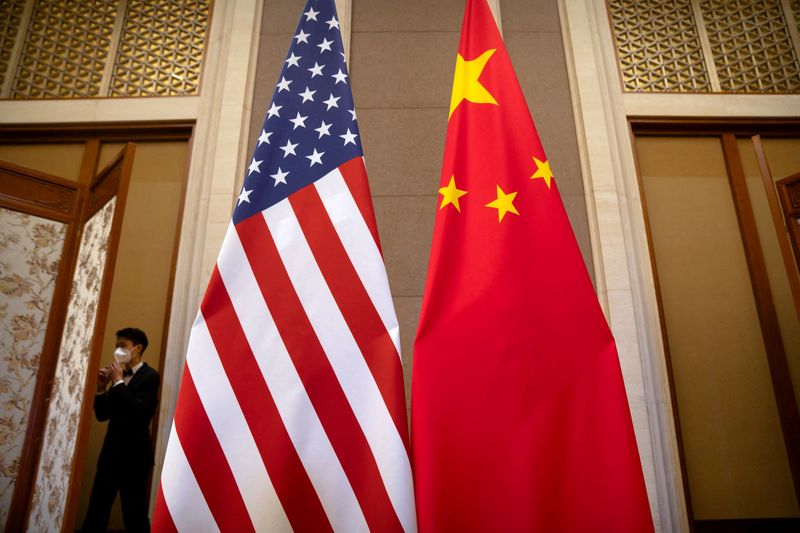By Nichola Groom
(Reuters) -Electric-vehicle batteries and other car parts are the latest products under scrutiny as part of Washington's effort to stamp out U.S. links to forced labor in Chinese supply chains, according to a document seen by Reuters, agency statistics and sources.
Until now, enforcement of a year-old U.S. law that bans the import of goods made in Xinjiang, China, has focused mainly on solar panels, tomatoes and cotton apparel. But now, components that may include lithium-ion batteries, tires and major automobile raw materials aluminum and steel are increasingly subject to detentions at the border.
Increased inspection of products destined for auto assembly plants by U.S. Customs and Border Protection (CBP) could signal difficult times ahead for automakers who will need solid proof that their supply chains are free of links to a region where the U.S. believes Chinese authorities have established labor camps for Uyghurs and other Muslim minority groups.
Beijing denies any abuses.
More than a year of enforcement of the Uyghur Forced Labor Prevention Act (UFLPA) has already stymied development of solar energy projects as detained panel shipments languish in U.S. warehouses. Installations of large solar energy facilities for utilities dropped 31% last year due to constrained panel supplies, according to the U.S. Solar Energy Industries Association trade group, which has said conditions have improved somewhat this year.
Both solar energy and battery-powered electric vehicles are critical industries in the Biden administration’s push to wean the U.S. from dependence on fossil fuels and to combat climate change.
When shipments are detained, CBP provides the importer with a list of examples of products from previous reviews and the kind of documentation required to prove they are not made with forced labor, CBP told Reuters.
That document, a recent version of which was obtained by Reuters through a public records request, was updated between April and June of this year to include batteries, tires, aluminum and steel, a CBP spokesperson said. When the law was beginning to be enforced last year, the agency was primarily focused on the three commodities identified as high priorities in the UFLPA statute: cotton, tomatoes and polysilicon, the raw material used in solar panels.
"The timing of these changes does not reflect any specific changes in strategy or operations," a CBP spokesperson said in a statement, adding that the list of eight product types was "not exhaustive."
The agency did not specifically respond to questions about increased scrutiny of automotive imports. It said its focus "is where there are high risks in U.S. supply chains."
In a report to Congress last month on UFLPA enforcement, CBP listed lithium-ion batteries, tires, "and other automobile components" among the "potential risk areas" it was monitoring.
The expanded focus is reflected in CBP data, which shows 31 automotive and aerospace shipments have been detained under UFLPA since February of this year. Detentions of base metal shipments, which would include aluminum and steel, have also soared from about $1 million per month at the end of 2022 to more than $15 million a month.
CBP said it was not able to disclose additional information related to enforcement activities.
AUTOMAKER EXPOSURE
Though the automotive detentions are small compared with the more than $1 billion of solar panel imports that have stalled at the border, they have put the industry on alert, according to attorneys and supply-chain experts.
"It's a very complex supply chain and obviously a detention would be incredibly disruptive to an auto company," said Dan Solomon, an attorney with Miller & Chevalier who advises manufacturers on potential forced-labor risks.
In May, Solomon spoke about UFLPA compliance at a private event for automotive executives in Detroit.
"Without a doubt the manufacturers are focused on it," he said.
The stepped-up focus on automakers follows a study by Britain's Sheffield Hallam University published in December that said nearly every major automaker has exposure to products made with forced labor in Xinjiang.
The report prompted a probe by U.S. Senate Finance Committee Chair Ron Wyden, which his spokesperson said is ongoing.
"It is appropriate for CBP to scrutinize imports in this space," Wyden said in a statement.
'REAL PERIL'
Of the 13 automakers and suppliers contacted by Reuters, four - Mercedes-Benz USA, Volkswagen (ETR:VOWG_p), Denso, Continental AG (ETR:CONG) and ZF Friedrichshafen AG - said they had not had products detained under UFLPA.
"Under the UFLPA, we've further increased our due diligence with global media screening, risk analysis and supplier and buyer training on sustainability and human rights," a Volkswagen spokesperson said in an email.
A Continental spokesperson said by email the company "is committed to human rights and respects and actively fosters those rights."
Ford, Bosch, General Motors (NYSE:GM), Honda, Toyota, Stellantis and Magna (TSX:MG) said in written statements that they were committed to ensuring their supply chains were free of forced labor but did not respond to questions about detainments under UFLPA.
Tesla (NASDAQ:TSLA) did not respond to requests for comment.

The chief executive of Exiger, a provider of supply-chain management software, said the solar detentions are an indication of where auto component enforcement may be headed.
"If you're a car manufacturer and you have not started mapping your supply chains for the critical minerals and the parts of the sub-assemblies that are going through China and where they are getting their goods from, you are running a real peril as we go into the back half of the year," Exiger CEO Brandon Daniels said in an interview.